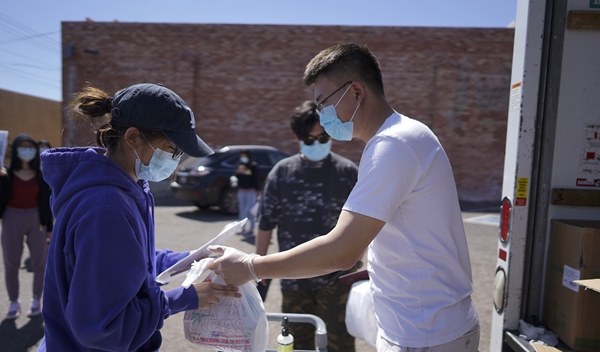
A Chinese student receives health kits provided by the Chinese embassy in the United States at University of Arizona on April 12, 2020. [Photo/Xinhua]
As new university semester is approaching, overseas Chinese students unable to return to universities in the United States because of the pandemic, which remains rampant there, have little option but to attend online classes overnight due to the time difference. The only other option is to suspend their schooling.
Ao Jiamin, a sophomore student majoring in interior design at the California College of the Arts, is staying at home in Hangzhou, capital city of east China's Zhejiang province. Ao has made the decision to suspend her schooling because of the continuous spread of the novel coronavirus disease, of which cases topped 5 million in the United States on Aug. 10.
"My professional facilities are not available here and professors cannot check my work, which, nevertheless, is essential to my academic improvement," she said.
Ao planned to get married upon her graduation, however, all her schedules have to be postponed because of the pandemic. But her parents said her safety is their top concern.
Between 2018 and 2019, nearly 370,000 Chinese students were studying at U.S. universities, accounting for one third of the country's overseas students.
Because of the difficulties in applying for a new visa, Zhang Xiaokun, who is a freshman majoring in social science at the University of California (UCSC), chose to take online classes at his Beijing home, regardless of the time difference.
"Since the professors have more time to prepare for online classes, the lessons will be much improved," he said, adding that he would save money spent on rent and food. He also said that meals served at home taste better.
Despite all universities in the United States converting to remote online teaching, this year's graduates are concerned about papers and employment.
Li Xinyu, who is a senior student majoring in business administration at the University of San Francisco is concerned about his graduation.
He chose to continue his online course because he is worried that he may not be able to graduate in the normal four years, which may, in turn, increase his employment pressure as he is scheduled to find a suitable job.
Although he chose to continue to take online classes, he still had some concerns. He is worried that the lack of direct communication with teachers and the inability to use the school's library resources might impact his studies.
In addition, the current political situation is very unfavorable for Chinese students studying in the United States, and they may not have the opportunity to go to the United States in the future, so he has to do everything possible to finish his studies.
Tang Jia'er, a freshman majoring in finance at the University of San Francisco decided to suspend his schooling.
Tang returned to China at the end of March, but because of the online courses, his body became very weak, and he could not sleep well. When he slept, he often worried about being late for class. He hopes the outbreak will end soon so he can go back to school next January.
"We don't have any other options right now, and it took a lot of hard work to get to this point," he said, adding that all overseas students studying in the United States hope that the epidemic and riots in the country can come to an end as soon as possible.




